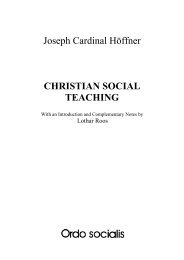Prof. Franz Josef Stegmann Bethlehem Social ... - Ordo Socialis
Prof. Franz Josef Stegmann Bethlehem Social ... - Ordo Socialis
Prof. Franz Josef Stegmann Bethlehem Social ... - Ordo Socialis
Create successful ePaper yourself
Turn your PDF publications into a flip-book with our unique Google optimized e-Paper software.
<strong>Stegmann</strong><br />
<strong>Social</strong> Market Economy to be a contradiction in itself, a "wooden iron", and rejected its social<br />
dimension. 44<br />
In 1997, the Latin American provincials of the Society of Jesus published a "Letter and Study<br />
Document on Neo-Liberalism in Latin America". They described ''the neo-liberal economic<br />
logic" in South America as "a concept of the human person which limits the greatness of man<br />
and woman to their capacity to generate monetary income". That is exactly the point of view<br />
from which classical economic liberalism and its absolute rationalism assess the world of<br />
industry and commerce, and reject any criteria coming from outside as "alien to the economy-<br />
including social and moral considerations”. Therefore, "neoliberalism, as it is understood in<br />
Latin America" - and in other parts of the world - "is a radical conception of capitalism". 45<br />
As far as I can see, neoliberalism as developed in Central Europe differs to a large degree<br />
from these examples and from what is called neoliberalism in other parts of the world. What I<br />
call "European neoliberalism”, in principle, adheres to the economy of free competition; at the<br />
same time, however, it recognises that old or classical economic liberalism has degenerated<br />
into a pure profit economy by establishing nightmares such as Manchesterism or Manchester<br />
Capitalism: therefore, European neoliberals try to eliminate it.<br />
After World War Two, to mention just one example, Alexander Rüstow - one of the<br />
neoliberal fathers of <strong>Social</strong> Market Economy - published the book The Failure of Economic<br />
Liberalism. 46 He pointed in particular to the lack of an economic framework in classical<br />
economic liberalism and to its "socially blind eyes". The hook became famous, was published<br />
in a number of editions, and had a great deal of influence on economics and economic policy.<br />
In contrast to the old economic liberalism, Alexander Rüstow and his fellow European<br />
neoliberals put special emphasis on the necessity for social conditions and objectives to be<br />
met and on the importance of a legal framework, set to economic activities and to the<br />
economy as a whole. They therefore created the term "Palaeoliberalism” in order to<br />
distinguish the old or palaeo - as the Greek expression reads - liberalism from the modern<br />
"socially orientated” 47 neoliberalism. This old or palaeo economic liberalism without social<br />
aims and social responsibility - and still existing in parts of the world -is considerably<br />
different from what they called neoliberalism, or "socially orientated" neoliberalism.<br />
(Whenever I use the expressions neoliberal or neoliberalism, I am talking about this European<br />
neoliberalism.) We should therefore watch closely in order to understand what sort of<br />
neoliberalism someone is talking about.<br />
An influential school of thought within neoliberalism is the so-called "ordoliberalism". Its<br />
main feature is the concept of "ordo": the ordered competition, the ordered economic<br />
conditions, ordered by a strong state. (The academic yearbook of neoliberal economics in<br />
Germany, which still exists today, is called <strong>Ordo</strong>.) The idea of ordered or regulated compe-<br />
44<br />
See Friedrich August Von Hayek, Gesetzgebung und Freiheit' Eine neue Darstellung der liberalen Prinzipien<br />
der Gerechtigkeit und der politischen Ökonomie, 3 Vols'' Landsberg am Lech 1980‐1981; 2nd volume: Die<br />
Illusion der sozialen Gerechtigkeit.<br />
45<br />
The Latin American Provincials of the Society of Jesus, Letter and Study Document on Neo‐Liberalism in Latin<br />
America, in: Promotio lustitiae, No' 67. May, 1997, 41‐60. 45. 48.<br />
46 2<br />
Alexander Rüstow. Das Versagen des Wirtschaftsliberalismus. Bad Godesberg 1950.<br />
47<br />
See Alexander Rüstow. Paläoliberalismus, Kommunismus, Neoliberalismus, in: Das christliche Gewissen und<br />
die Soziale Marktwirtschaft. Offprint from Junge Wirtschaft, No. 2 / February 1960, 3‐7.<br />
23















